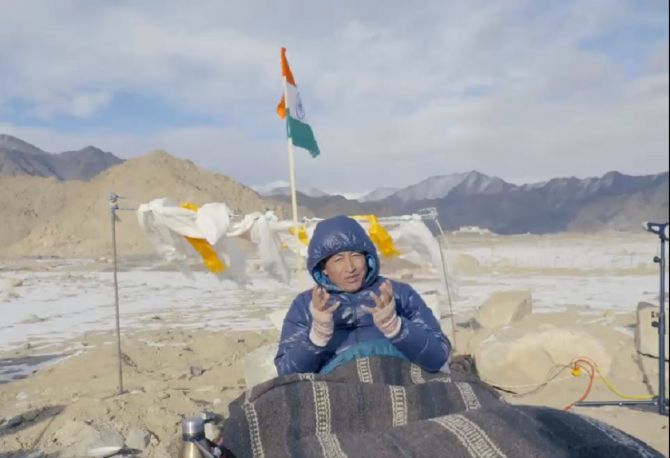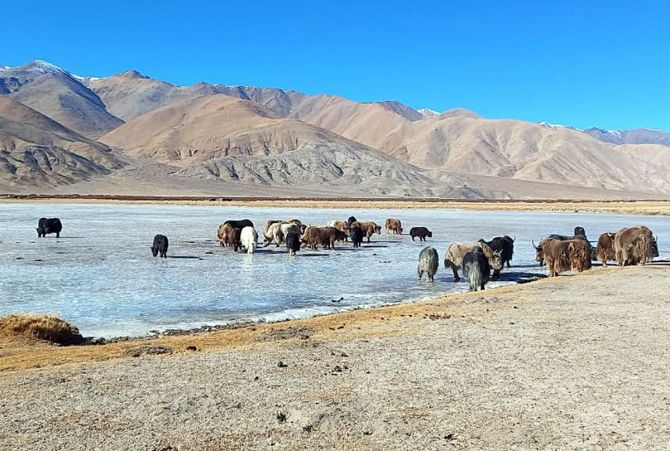'Our villagers used to go up to Finger 4 and Finger 6, but today the Chinese are there.'
'Since April 2020, Chinese troops have blocked Indian troops from reaching at least ten patrolling points running from the Depsang plains in the north to Pangong Tso lake in the south.'

Union Territory Ladakh has been witness to large demonstrations where residents of both Leh and Kargil have joined hands to demand the implementation of the Sixth Schedule of the Constitution as has been done in the border states of Assam, Meghalaya, Tripura and Mizoram.
Konchok Stanzin, a councillor of the Ladakh Autonomous Hill Development Council, resigned from the Bharatiya Janata Party because despite the Centre giving assurances that as a UT, Ladakh would be sufficiently empowered to protect the interests of their largely tribal population with its distinct ethnicity, culture and custom, this has not been the case.
"Look at the situation from a historical perspective. China took our land in 1952, then in 1962, then 2020, and now in 2022. All our grazing lands are disappearing," Konchok Stanzin tells Rediff.com Senior Contributor Rashme Sehgal.
The BJP leadership is not happy with your demand for the implementation of the Sixth Schedule.
environmentalist Sonam Wangchuk's recent five day fast saw him go public with this demand.
Ladakh has a 95 per cent tribal population with its own distinct identity.
The abolition of Article 370 and Article 35A which had ensured that only permanent residents could buy land or be given jobs in the state has been taken away.
We had welcomed the revocation of Article 370 because we were given the assurance that the Ladakh Autonomous Hill Development Council would be empowered to take decisions.
Our experience during the last three years has proved very disappointing.
Not only were they given no autonomy, but power today wrests entirely with the lieutenant governor and his team of bureaucrats.
Are you saying the voices of the members of the the Ladakh Autonomous Hill Development Council are not being heard?
When the Centre made Ladakh a UT, we thought it would serve to empower the existing hill councils of both Leh and Kargil.
Initially, the BJP had also supported our demand for the Sixth Schedule, but they later distanced themselves from it which is why I tendered my resignation from the party and fought the LAD elections as an Independent candidate.
We want Constitutional safeguards to protect our land, employment and cultural identity.
Sadly, today it is the bureaucrats who are ruling the UTS. The local people have been given no voice.
Removal of Article 370 has created a situation where we have been left with no land protection.
Outsiders are being allowed to buy our land and during the last three years, the maximum amount of land has been bought by outsiders to set up their own business.
No jobs have been created for any gazetted post except some jobs in the police force.
Our demand now is for full statehood. Politicians are accountable to the public. The bureaucracy is not accountable to anybody.
Once the Sixth Schedule is implemented, no outsider will be allowed to buy land.
You represent the border area of Chishul in the the Ladakh Autonomous Hill Development Council.
My constituency of Chusul is right on the LAC (Line of Actual Control, the border between India and China) and for the last three years I have been stressing that the villagers here have lost access to vast grazing areas near Gogra owing to the growing Chinese presence.
Our traditional grazing areas have become buffer zones.
Till a few years ago, our villagers used to go up to Finger 4 and Finger 6, but today the Chinese are there.
Since April 2020, Chinese troops have blocked Indian troops from reaching at least ten patrolling points running from the Depsang plains in the north to Pangong Tso lake in the south.
Similarly, the villagers of Lukung, Phobrang and Yourgo decided on their own initiative to take their cattle up to the Kiu La pass which is a traditional grazing ground.
The Indian Army refused them access.
The fact is the Chinese are nibbling away at our territory.
In a recent paper by the SP (superintendent of police) Leh presented before the ministry of home affairs in January 2023, Home Minister Amit Shah was informed that India has lost presence in 26 of 65 patrolling points in eastern Ladakh.

How many villages in your constituency have been affected?
My constituency is spread over a wide area. More than eleven villages have been adversely affected in my constituency.
Loss of grazing land means grass is no longer available for their livestock which includes pashmina goats, yak and horses.
Have you raised this issue with the Centre?
I have been warning the central government for last three years that the situation is not good, but there has been no official response from any leader.
Now the SP Leh has given a ground report of the actual situation.
The problem is that in all ministry-level talks, our views are not represented. The local people are not taken into confidence.

But the official response is that there is no loss of Indian territory.
Army officers are stationed here for two years and then get transferred.
But we -- our fathers and forefathers -- have been here for generations.
I must point out that the civilian perception of the Line of Actual Control is different from the army perception. Sadly, both sides are not talking to each other. There is no proper dialogue on both sides.
When I raised this issue, the ministry of defence issued a statement saying that due to present operational situation in Ladakh, grazers have been asked to restrict their movement.
The army keeps saying we have not lost land, but the buffer zones are now all in India.
Earlier, we were allowed to go up to Finger 6, now we are not allowed even up to Finger 3. I should know.
I am a representative of that area. Everything is there in the revenue records. The Centre just needs to check them.
Look at the situation from a historical perspective. China took our land in 1952, then in 1962 then 2020 and now in 2022. All our grazing lands are disappearing.
The Indian government needs to put up permanent observation points that will serve as landmarks.
These will be permanent structures and will help ensure that China does not try and take over our land. After all, that is what China is doing on their side.
How has the nomad population reacted to the loss of their grazing pastures?
They are in a state of dismay. Many have sold their livestock and are moving to the outskirts of Leh.
These nomads are the eyes and ears of the Indian armed forces. The first line of defence. They are doing patrolling round the clock. They should be encouraged to live in these villages.
It should be mandatory for the government to give them regular salaries.
As it is, the younger generation no longer want to live in these harsh conditions.
Looking after livestock is not easy.
The medical infrastructure here also needs to be improved as this will encourage people to continue to stay here.

You have also highlighted the issue of lack of connectivity.
There is no mobile connectivity in the border areas and despite our repeated pleas, the administration has failed to act.
Whenever a VIP arrives in these areas, connectivity is given for a few hours and then it is back to square one.
After the 1962 War with the Chinese, the nomads returned to their homes and it was they who helped locate the dead bodies of fallen Indian soldiers.
The army came to know about the fallen soldiers from them.
Of course, today, a great deal has changed. There are between 50,000 to 60,000 soldiers stationed in eastern Ladakh.
The Centre is focusing on increasing infrastructure. But the government needs to ensure that their lives and livelihood are not disrupted.
Feature Presentation: Aslam Hunani/Rediff.com










